
~~
After an opening defeat against defending gold medalist Sweden, the Japan women's curling team bounced back with an 8-5 victory over Canada on Friday afternoon, February 11 in a round-robin session match.
The stakes were high strategizing against Team Canada, the Olympic champion at the 2014 Sochi Winter Games and the world champion in North Bay, Canada in 2018.
At the National Aquatics Centre, Japan took an advantage of 5-2 by the end of the sixth end. Thanks to the high performance of the Japanese players, who maintained an overall accuracy rate of 80% throughout, the score quickly increased.
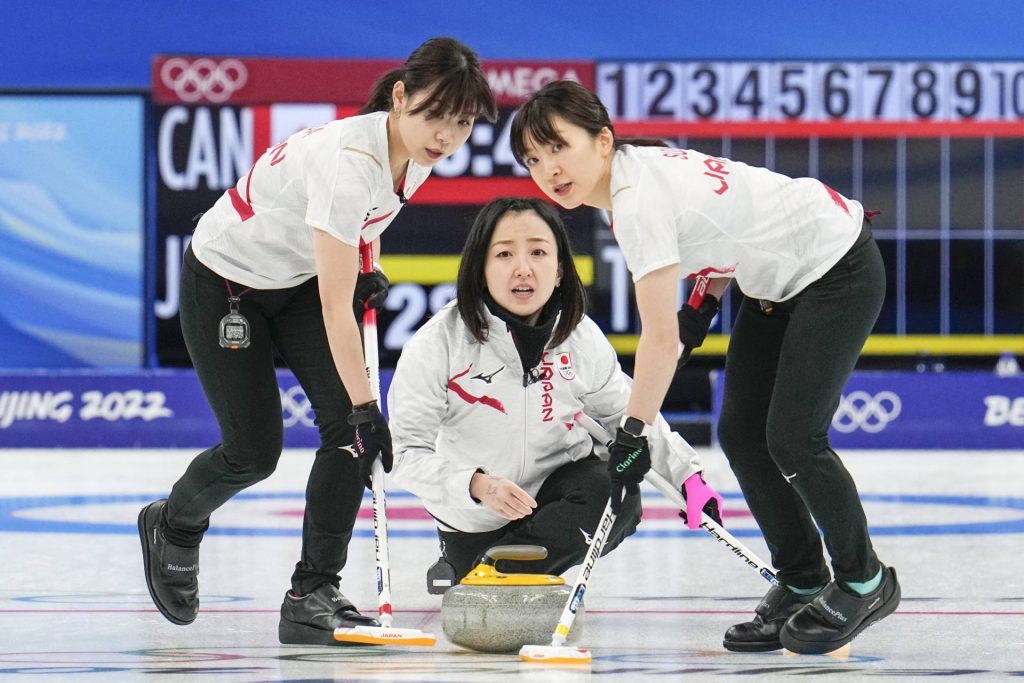
Satsuki Fujiisawa (center) shoots the stone in the third end as Japan teammates Yurika Yoshida (left) and Yumi Suzuki sweep against Canada at the Beijing Olympics on February 11.
Notably, skip Satsuki Fujisawa’s 97% accuracy in the draw was instrumental in the team’s result.
One striking opponent for the Japanese team was Canada skip Jennifer Jones, who brought the score to 5-4 with the final throw of the sixth end. The 47-year-old had previously led the Canadian team to victory in Sochi in 2014.
However, Japan snatched back the advantage in the following end. The 10th and final end was fiercely fought, including a double takeout of the Canadians’ stones by Fujisawa.
With only one stone left for each team, and the end of the game in sight, the Canadian team conceded defeat.
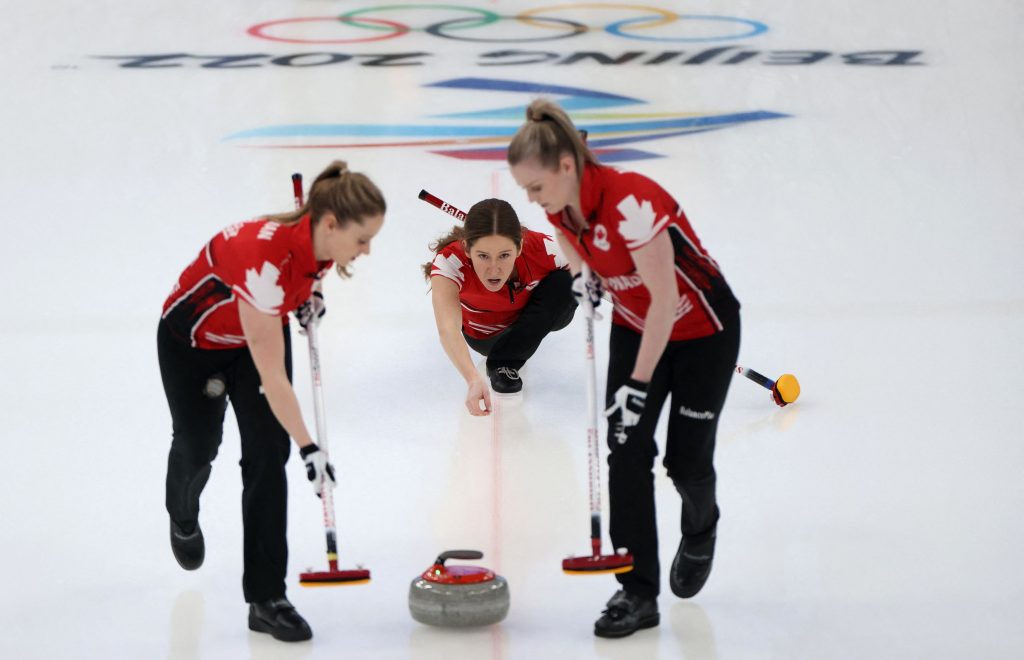
Canada's Kaitlyn Lawes (left) and teammates Jocelyn Peterman (center) and Dawn McEwen in action.
(Evelyn Hockstein/REUTERS)
“We understood that we needed to improve some points from yesterday’s match [against Sweden], and therefore we came together and we did well,” Fujisawa told NHK.
Jones complimented Japan for an "outstanding" game, as she told Kyodo News:
"They didn't give us a sniff," she said. "We'd have an opportunity and then they'd make a great shot, so we can't take anything away from them."
“Today we want to just rest, sleep well, and focus on not oversleeping tomorrow!” joked Fujisawa after the match, with her characteristic cheerful attitude.
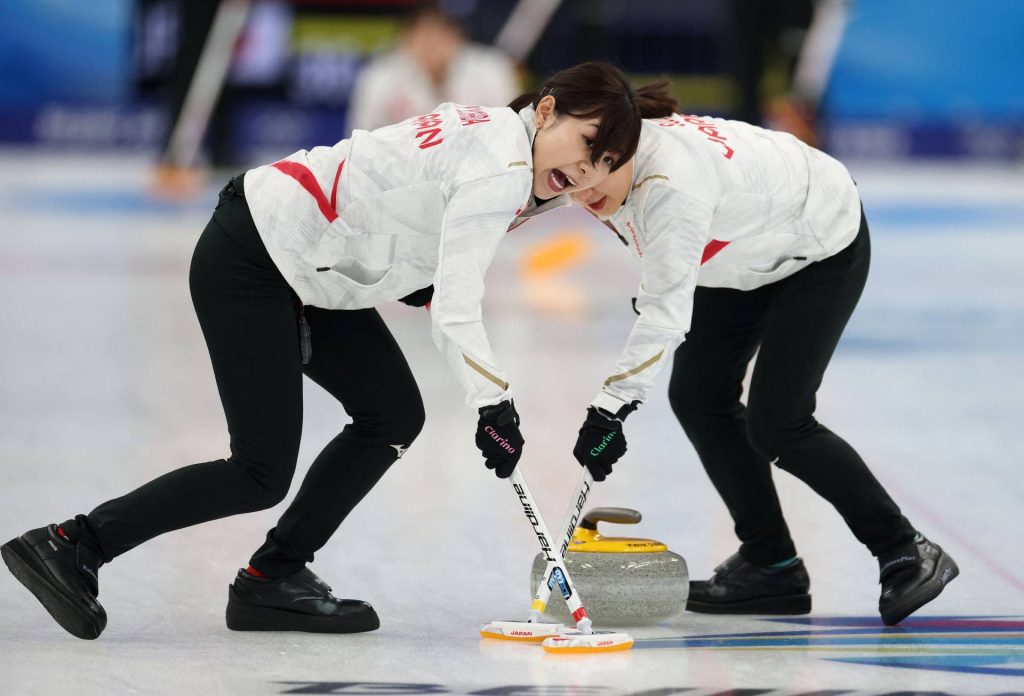
Japan's Chinami Yoshida (left) and Yurika Yoshida sweep. (Evelyn Hockstein/REUTERS)
Japan, which is ranked seventh in the world, faces Denmark and the Russian Olympic Committee in a pair of round-robin matches on Saturday, February 12.
The Japan women’s curling team, called Loco Solare, captured the imagination of people at home in 2018 by winning the country’s first Olympic medal in the sport ― a bronze ― at the Pyeongchang Games. The team members’ signature catchphrase “Soudane!” became a symbol of their upbeat exchanges during the Games, even became a candidate for the Buzzword of the Year in 2018.
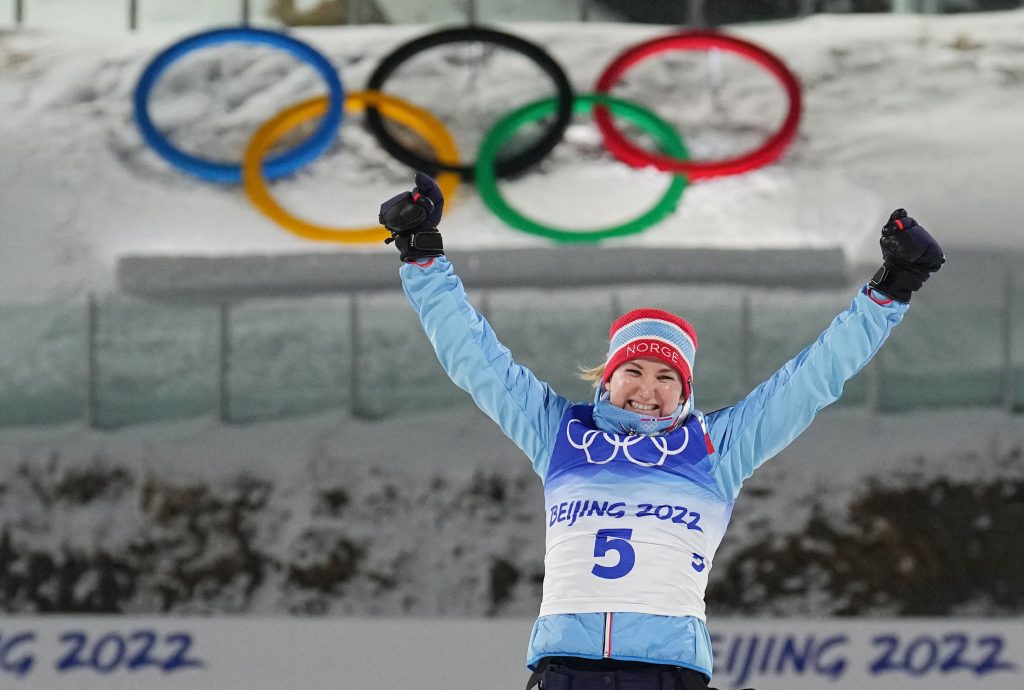
Women's biathlon 7.5-km sprint gold medalist Marte Olsbu Roeiseland of Norway celebrates on the podium at the National Biathlon Centre in Zhangjakou, China, on February 11. (Athit Perawongmetha/REUTERS)
Biathlon
Norway's Roeiseland Triumphs in Women's 7.5-km Sprint
History was made in the biathlon competition, which combines cross-country skiing and rifle shooting, on Friday night.
Norway's Marte Olsbu Roeiseland stunned the competition by winning the 7.5-km biathlon sprint race, scoring a perfect 10 out of 10 shots. This was the second gold medal for the 31-year-old athlete, who was part of the winning Norwegian team in the 4x6 km mixed relay.
Sweden’s Elvira Oeberg secured the silver medal, 30.9 seconds behind Roeiseland. Oeberg was Youth World Championship winner in 2018 in the women’s 6-km sprint in Otepaa, Estonia, and the 22-year-old Swedish athlete is considered a prodigy in the discipline.
Italy's Dorothea Wierer picked up bronze.
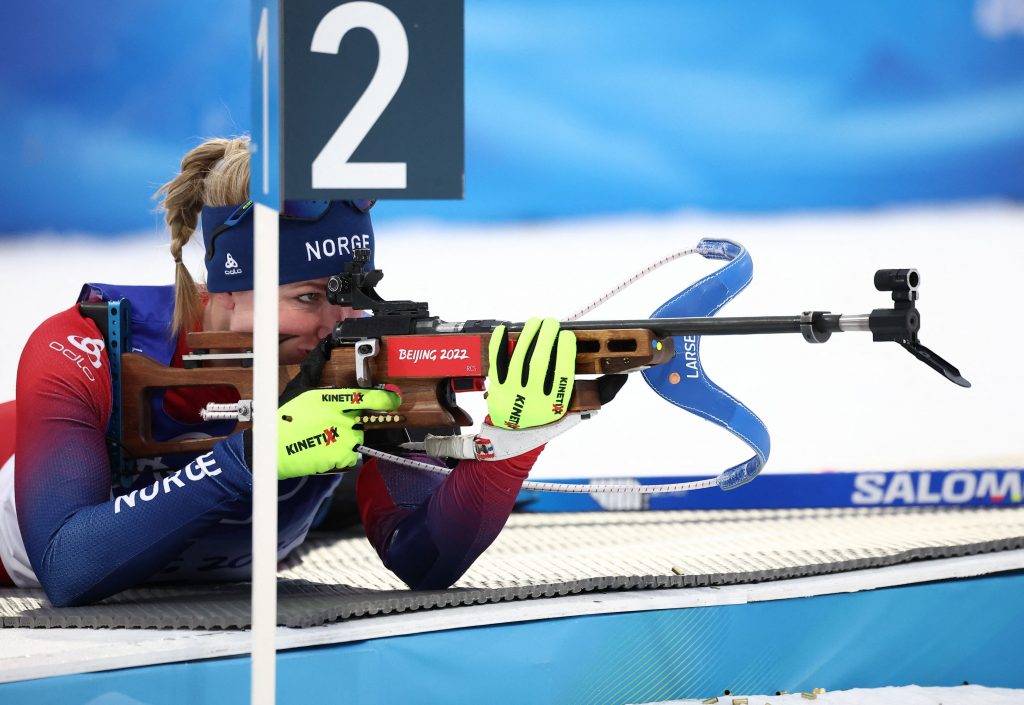
Norway's Marte Olsbu Roeiseland in action in the women's biathlon 7.5-km sprint. (Kim Hong-Ji/REUTERS)
In the women’s biathlon 7.5-km sprint, athletes go around for three laps and have prescribed stops for rifle shooting.
The sport as a whole debuted at the 1960 Winter Olympics in Squaw Valley, California. A related discipline ― called military patrol ― made its first appearance in 1924 in the very first Winter Olympics in Chamonix, France.
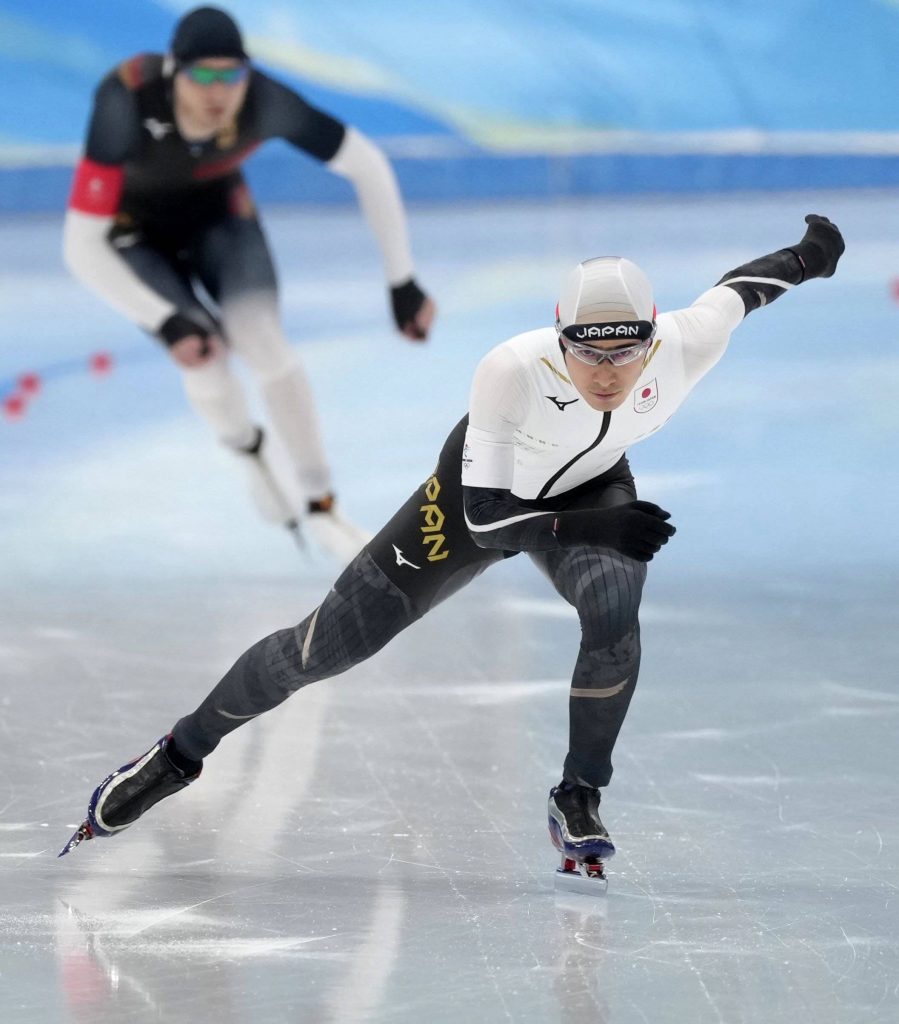
Ryosuke Tsucihiya races in the men’s speed skating 10,000 meters at the National Speed Skating Oval on February 11.
Speed Skating
Tsuchiya finishes 11th in men's 10,000 as van der Poel sets world record
Two-time Olympian Ryosuke Tsucihiya placed 11th in the men’s 10,000 meters at the National Speed Skating Oval on Friday.
Tsuchiya completed the race in 13 minutes, 2.49 seconds in his duel with Germany’s Patrick Beckert. They were the third of six pairs in the competition.
The 27-year-old Tsuchiya was 10th in the event at the 2018 Pyeongchang Games.
Sweden’s Nils van der Peol won the gold with a world-record time of 12:30.74. Patrick Roest of the Netherlands grabbed the silver in 12:39.95, while Italy’s Davide Ghiotto nabbed the bronze (12:45.98).
Van per Peol took a two-year sabbatical from speed skating after the Pyeongchang Games.
Van der Poel broke his own world record en route to gold. He had set the previous mark (12:32.952) at the 2021 World Single Distance Championships on Valentine’s Day in the Netherlands.
He won his first gold in Beijing on February 6 in the 5,000 with an Olympic-record time of 6:08.84.
The journey from the displeasure of his result in South Korea (placing 14th in the 5,000) to winning a pair of gold medals in Beijing has left Van de Peol “very satisfied,” he said on Friday.
“This was the main goal when I started three years ago. It turned out a lot better than I could have ever imagined," the 25-year-old Swede told reporters.
Discussing his tactics in the grueling 10,000, he added: “I didn’t want to risk going too hard too early. With five laps to go I felt like the world record was in reach so I just went for that.”
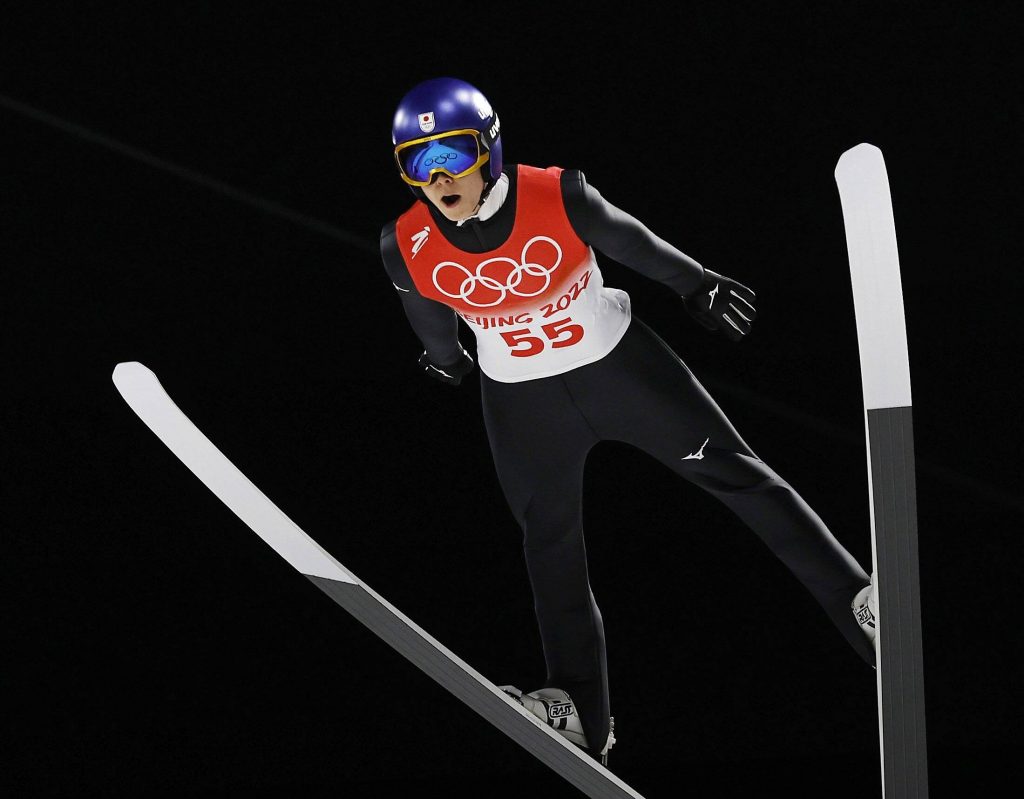
Ryoyu Kobayashi participates in the Beijing Olympics' men's ski jumping large hill qualification round at the Zhangjiakou National Ski Jumping Center on February 11.
Ski Jumping
Normal Hill Gold Medalist Kobayashi Qualifies 9th for Large Hill Final
Ryoyu Kobayashi soared 128.0 meters through the air during the men's large hill qualifying round on Friday night at the Zhangjiakou National Ski Jumping Centre, earning 121.3 points.
Kobayashi's solid effort put him in ninth place entering the next qualifying round on Saturday. The top 30 out of that round will move to the final round.
He won the gold medal, Japan's first of the Beijing Games, in the men's normal hill final on February 6.
Norway's Marius Lindvik finished first in qualifying with 136.4 points. He jumped 135.0 meters, the best of the 56 men who competed in the qualifying round.
Halvor Egner Granerud, also of Norway, was the runner-up in qualifying (131.6 points). Slovenia's Peter Prevc was third (128.3).
For Japan, Yukiya Sato, Naoki Nakamura and Junshiro Kobayashi, Ryoyu's older brother, were 23rd, 26th and 32nd, respectively.
Follow the 2022 Winter Olympics in greater detail on JAPAN Forward’s dedicated sports website, SportsLook.
Authors: Arielle Busetto, Ed Odeven








